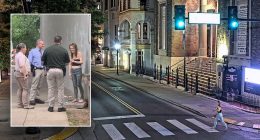When former guerrilla member Gustavo Petro ran for president in 2018, he was so keen to convince voters he would not rewrite the constitution that he had the pledge etched on a marble slab.
Petro finally won the presidency almost two years ago, but now he is striking a very different note. The power to change the constitution, he said in a speech this month, was not “a phrase plucked from the air” but “an opportunity for the Colombian people to take the reins of their own destiny”.
Petro claimed opponents were blocking him from carrying out campaign pledges, adding: “They’re enraged by the colour of my skin, by the fact that I was born in a humble home and studied in a public school.”
The leftist president had already upset business leaders with an abrupt move away from oil and mining and unnerved the middle classes with plans to nationalise pensions and health.
He has now said he wants to create people’s assemblies to implement reforms — bypassing congress and the courts — and has implied they could amend the constitution, alarming human rights groups and opposition politicians. His proposals appear to spring from frustration that the broad coalition he initially formed has fallen apart, complicating his ability to push through changes.

Some analysts see potential similarities with Hugo Chávez, the late Venezuelan authoritarian leftist who after taking office in 1999 decreed a constituent assembly, bypassing congress and the courts.
Chávez consolidated power, increased state control over the economy, boosted spending and cracked down on the opposition. Under his chosen successor, Nicolás Maduro, the economy collapsed and more than 7mn Venezuelans fled the country, of whom about 2mn are in Colombia.
“Both leaders consider their political project a form of ending the entire existing system and creating a totally new institutional framework adjusted to their own needs,” said Nastassja Rojas, a Venezuelan political science professor at the Javeriana university in Bogotá.
Colombia’s current charter was written in 1991 with input from the guerrilla movement to which Petro belonged, the M-19, which had demobilised and become a political party. The document strengthened democracy, created independent institutions, decentralised power and introduced social reforms.
Exactly how Petro would approach a constitutional rewrite remains a mystery. Under the current charter, summoning a constituent assembly requires approval from both houses of congress, where the president lacks a majority. Iván Name, president of the senate, has told Petro “not to debase democracy” by seeking to supplant that mechanism.
Petro himself has added to the confusion with vague or contradictory references. In some speeches he has said he wants people’s assemblies summoned to apply the existing charter. At other times he has suggested that the process of drafting a new constitution has already begun because the people have started it spontaneously.
Moisés Wasserman, a Colombian scientist and former rector of the National University, said: “He seems to be suggesting people’s assemblies, which are tremendously anti-democratic because they can easily be manipulated. Any impartial observer knows that assemblies of small groups don’t represent the population.”
An adviser to Petro told the Financial Times on condition of anonymity: “The constituent assembly is the people, and that is what he is referring to.”
“The president likes to measure his muscle” by calling supporters to the streets, they added. “Now he feels stronger.”
Petro led big anti-government protests during the presidency of his rightwing predecessor. Now, he is responding to legislative setbacks and criticism of his government’s record by calling demonstrations to rally supporters.
Esperanza Guarico, who works in construction and marched in support of Petro on May Day, said the turnout that day gave the president a mandate to convene a constituent assembly.
“The first voice in a country’s constitution is the people and they have spoken today, after forever being ignored,” she said.

But Petro’s reform push has prompted counterdemonstrations. On April 21, hundreds of thousands of people took to the streets in cities throughout Colombia to protest against him, a movement Petro later dismissed as a “march of death”.
Opposition leaders privately say they are drawing up plans for national strikes to paralyse the country if Petro attempts to decree a constituent assembly.
The temperature of the debate rose this week after two electoral magistrates called for an investigation into what they said were irregularities in the financing of Petro’s campaign.
Petro attacked what he called a “soft coup”. “It’s a clear break with the constitution,” he wrote on X, inviting members of his party and the “social forces of the country” to ready themselves “against an attempt to disrespect the popular vote”.
“Democracy has entered an emergency,” he added.
Alejandro Gaviria, who served as Petro’s education minister from August 2022 until February 2023, said: “Petro has lost interest in governing and is focused on building a narrative that he was sabotaged, so that he can fight for power [at the next election] in 2026.”
Gaviria added: “He’s now at his most populist.”
Petro was elected with the support of a broad centre-left coalition, but eight months later fired moderate ministers and this year has replaced respected technocrats in critical institutions with radical activists.
Meanwhile, the economy has stalled, barely growing last year. It is projected to expand 1.3 per cent this year. Investment has dried up, capital has fled abroad and inflation remains stubbornly high at 7.4 per cent in the year to March.
Petro’s opponents take heart from his low approval rating, which sits at 36 per cent, according to Datexco.
But the president has no intention of backing down. Buoyed by applause and cheers, in his May Day speech he hit back at critics who say he wants to circumvent the existing constitutional ban on re-election.
“Those addicted to power end up killing, but power needs to be handed over to the people,” the president said. “What I want is a real democracy for everyone.”
Also Read More: World News | Entertainment News | Celebrity News








